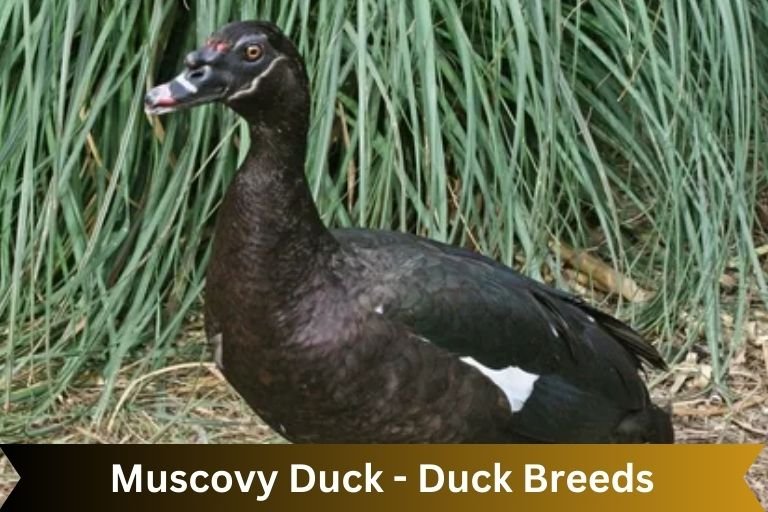The Muscovy duck is a unique breed with a striking appearance and special characteristics. Originating from South America, these ducks are known for their distinct features and behaviours. Unlike other ducks, Muscovies communicate through hisses, coos, and gentle murmurs instead of quacking. This adds a mysterious touch to their presence.
Muscovy ducks have a regal posture and an enigmatic vibe that has fascinated bird enthusiasts and farmers for centuries. Their red facial caruncles give them a majestic look that sets them apart from other birds.
Muscovy ducks have thrived in various environments worldwide, showcasing their story of survival and adaptation.
Muscovy History
The Muscovy ducks is a hardy bird that can adapt well. It originated in South America and was taken to Europe in the 16th century. Russians enjoyed their delicious meat and served them at fancy events.
Raising Muscovy ducks was thought to bring luck and wealth. In ancient Russia, breeders selected ducks with the best size, color, and behavior. Muscovy ducks remain an essential symbol in Russia, representing tradition and nature.
Duck Identification
The Muscovy ducks are giant and have red patches on their faces, which makes them different from other ducks. Some people think it’s a wild duck. Birdwatchers are interested in the behaviors and traits of Muscovy ducks.
Interestingly, unlike most ducks that nest on the ground, they like to sit in trees and build nests high up. This shows how they do well in wooded areas near water.
They eat insects, plants, and small fish. Watching these behaviors can help us understand this special duck and other birds in different habitats.
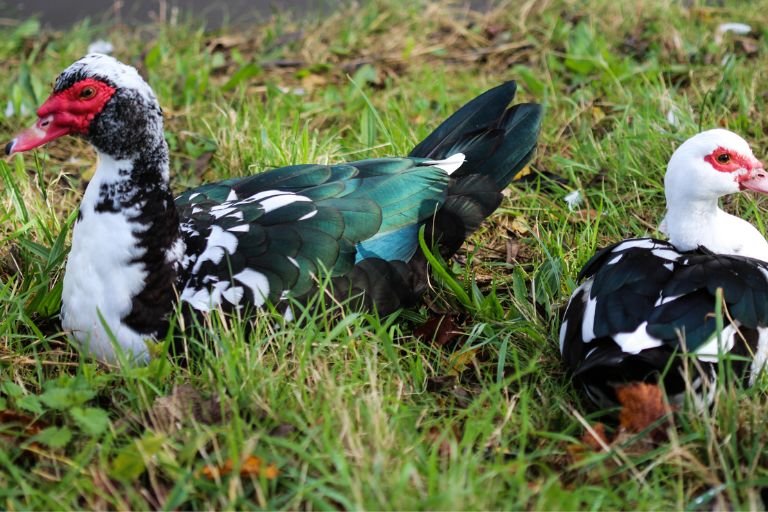
Duck With Red Face
The Muscovy duck has a red face that helps it look healthy and robust, making it appealing to other ducks. The intensity of the red colour can vary depending on diet and environment.
Despite its bold appearance, the red-faced Muscovy ducks are friendly and protective of their family. Understanding their behaviour can help us bond with these remarkable ducks and discover lessons in loyalty and strength.
The Biggest Duck In The World
The Muscovy ducks are the most giant in South America; they can grow up to 33 inches long and weigh 15 pounds.
Muscovy Duck Size
The Muscovy ducks are more significant than other types, with males weighing 10-15 pounds and females weighing 6-8 pounds. Their size makes them noticeable among smaller ducks, making them fun to watch.
Their enormous size and strong muscles give them a powerful presence, especially when they walk by the water or float on a calm pond.
Duck Colour
The Muscovy ducks have attractive colours: black, white, green, or purple. These colors come from unique pigments in their feathers called carotenoids, which also give flamingos and other birds their bright colors.
Can Ducks Fly
Ducks can fly, but not all do it a lot. Muscovy ducks are good at flying. They use their wings to escape danger or travel short distances, not for long trips. Muscovy ducks can also roost in trees, unlike other ducks. Some people may not know this, but these ducks fly well.
Duck Feed
Ducks eat grains, vegetables, and insects to stay healthy and have lovely feathers. The food they eat affects how many eggs they lay. Giving them the proper nutrients can improve the quantity and quality of their eggs.
Offering various feeds like pellets and crumbles can make mealtime fun. Healthy and happy ducks lay more eggs, so giving them good feed is vital for successful duck raising.
Feeding Baby Ducklings
Feeding baby Muscovy ducklings is fun and fulfilling. They eat bugs, worms, fish, greens, and waterfowl feed. Watch how much they eat and what they like. Give them different foods to help them grow and stay healthy.
Duck Care
Muscovy ducks are different from other ducks because they hiss instead of quack. They need a special diet of grains, vegetables, and pellets. They are good at finding their food, like insects and worms.
Muscovy ducks like swimming and sleeping in trees. Make sure they have a clean place to sleep for their health. Taking good care of your Muscovy ducks will make them friendly and fun to watch.
Laying Ducks
Provide a cozy nesting spot with soft bedding to care for laying ducks. Ducks prefer private areas to lay eggs comfortably. Feed them a balanced diet of duck food, fresh greens, and insects. Ensure they have clean drinking and bathing water to stay healthy and productive.
How To Take Care Of Ducklings
As a Muscovy duck owner, keeping your ducklings warm and dry is essential. Provide fresh water for them to drink and swim in. Feed them commercial duck food and vegetables.
Keep their living area well-ventilated to prevent breathing issues. Clean their space often to avoid infections. Spend time with your ducklings to build trust and bond with them.
Duck Vaccination
Muscovy ducks need regular vaccinations to stay healthy. They should be vaccinated for botulism and avian influenza. Following the correct vaccination schedule is vital to maintain their health.
Vaccines help protect ducks from diseases. Duck owners can keep their ducks safe by getting vaccines on time and following guidelines.
Muscovy Duck Meat Taste
Muscovy meat has a unique, rich flavor that chefs enjoy for its tender, juicy texture. It can be cooked in various ways, like roasting or grilling, and pairs well with sweet or savory ingredients.
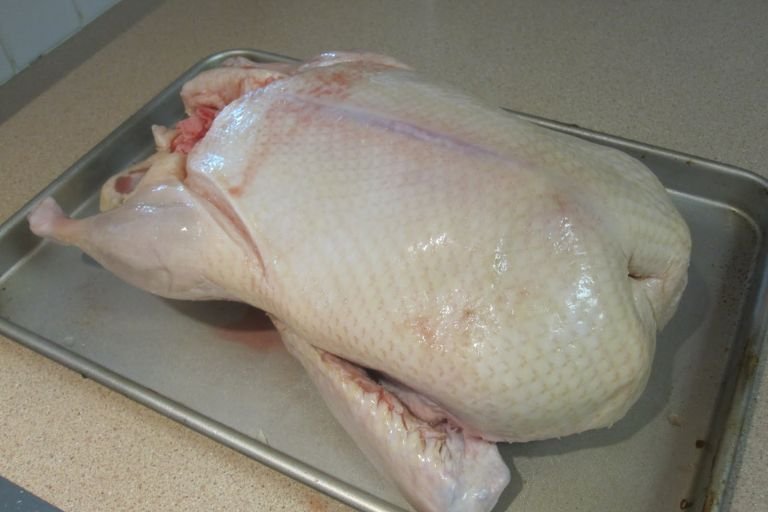
Muscovy Duck meat is ideal for creating flavorful dishes, perfect for special occasions or enhancing everyday meals. Muscovy meat always provides a memorable eating experience, whether alone or in recipes.
Is Duck Breast Healthy
Roasted Muscovy breast is a tasty dish that is good for you. It is high in protein, which helps build and repair muscles. It is a good source of essential vitamins such as B6 and B12, crucial in maintaining healthy nerve function and red blood cell production.
Muscovy breasts have healthy fats that can help your heart by lowering bad cholesterol and supporting overall heart health. It’s a good choice for adding lean proteins to your diet without losing flavor.
Eating roasted Muscovy ducks breast in moderation can be part of a healthy diet that supports overall well-being and nourishes your body.
What Is Duck Meat Called
Ducks and geese have white meat that tastes different from chicken and turkey because of their active lifestyle. The breast meat is darker and richer in flavor. Duck and goose meat is more flavorful than traditional white meat, offering a unique cooking experience that blends tradition with modern trends.
Can You Have 2 Male Ducks Together
Muscovy ducks are friendly and attractive pets. Some wonder if two male ducks can live together. Male ducks can be territorial and aggressive, but introducing them early and giving them space can help prevent fights. It’s essential to establish a clear hierarchy to maintain peace.
Can Male Ducks Change Gender
Male ducks, such as Muscovy ducks, can alter their looks and actions based on their group’s social structure. Some male ducks may display male and female characteristics called intersexuality. Scientists study this to explore gender fluidity in animals.
Understanding these ducks challenges our views on gender. Male ducks changing gender shows nature’s unexpected and diverse aspects, highlighting the natural world’s beauty. This tale of male ducks changing gender is just one of nature’s intriguing ways.
How Long Do Ducks Live
Muscovy ducks have red wattles and are heavy. They live longer than other ducks, up to 10-20 years in the wild and even 30 years in captivity. Their ability to adapt and live in different places helps them live longer. Food, habitat, and predators can also affect how long they live.
Behaviour
Muscovy ducks act differently from other ducks. They are calm and quiet, using hissing or soft sounds to communicate. Female Muscovy ducks are caring mothers, protecting and teaching their ducklings—muscovies like to perch in trees or high places, unlike other ducks that prefer swimming.
Are Male Ducks Aggressive
Male Muscovy ducks are sometimes called aggressive because they protect their territory. This behavior is mostly a defense mechanism, not a natural trait.
They may seem aggressive during mating season but are just trying to defend their space and babies. Issues can be avoided with the right approach and knowledge of their behavior.
Are Ducks Loyal
Muscovy ducks are known for being very loyal. They form strong bonds with their mate in the wild and stay together for life. They are faithful not only to their partners but also to their families.
Duck Egg Laying Age
Muscovy ducks are good at laying eggs. People often ask when these ducks should start laying eggs. Muscovy ducks start laying eggs at 5-6 months old. Unlike other ducks, Muscovy ducks don’t always lay eggs simultaneously. Food, surroundings, and genes can affect when a Muscovy starts laying eggs.
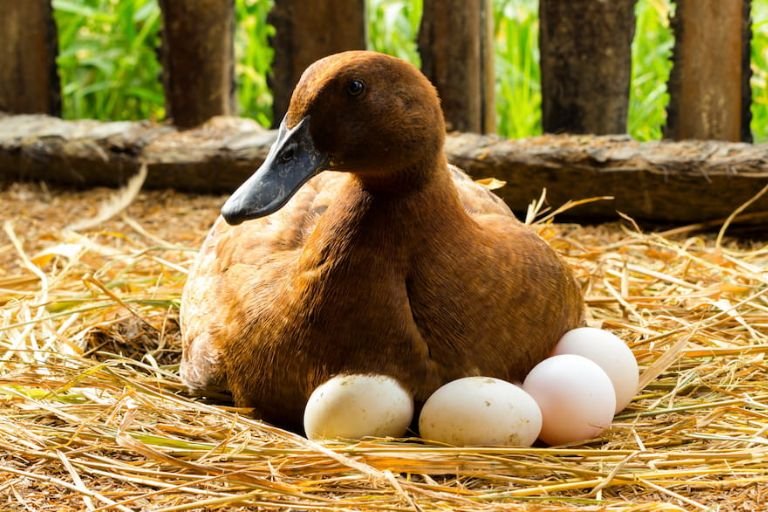
Duck Egg Laying Season
Muscovy ducks lay many eggs during the egg-laying season, with some females laying up to 80 eggs in a year. This season usually happens from late winter to early summer when there is more daylight and warmer temperatures. Egg laying is essential for Muscovy ducks because it helps their species survive and grow.
Duck Egg Colour
Their eggs come in white, cream, blue, and green colors. This variety is because Muscovy ducks have diverse genes. This makes their eggs look interesting when collected. Unlike chicken eggs, which are usually the same colour, her eggs are a fun surprise each time they are laid.
How Long Will A Duck Leave Her Eggs
A duck leaves her eggs during the day to take care of herself. She returns to keep the eggs safe and warm for the ducklings inside. The length of time she is away can vary depending on the weather, food availability, and dangers nearby.
Some ducks leave briefly, while others are gone for more extended periods.
Duck Diseases And Treatment
Muscovy ducks can get sick like other pets. One common illness they may get is botulism, a severe infection that can be deadly if not treated quickly. Signs of botulism in ducks are weakness, tiredness, and trouble breathing. Treatment usually includes giving antibiotics and care to help the duck get better.
Duck Virus Hepatitis
Muscovy Duck Virus Hepatitis (MDVH) is a highly contagious disease primarily affecting Muscovy ducks. It harms the liver and can lead to death in infected birds.
The virus spreads rapidly through contact with infected birds or unclean areas. It is crucial to prevent and control the disease to protect duck populations.
Fowl Cholera
Duck plague, also known as Fowl Cholera, is a highly contagious and often deadly virus that affects waterfowl, particularly Muscovy ducks. The virus spreads quickly through contact with sick birds or dirty areas, causing significant problems for farmers.
Symptoms of Fowl Cholera include sudden death, breathing problems, diarrhea, and nerve issues. This disease can linger in the environment long, making complete eradication difficult.
The virus can survive in water and infect healthy birds that drink or swim in it. Farmers must take strict measures to protect their flocks and prevent outbreaks.
Newborn Sticky Eye
A sticky eye is when a duckling has gunk around its eyes, making it hard to see and feel uncomfortable. It usually goes away as the duckling grows older. One reason for sticky eye in Muscovy ducklings is not keeping their living area clean. Keeping the brooding area clean and dry can prevent this issue.
Bumblefoot Duck
If you see a Muscovy duck with bumblefoot, it can be worrying. Bumblefoot is a common problem that affects ducks’ feet, causing discomfort and trouble walking. It happens when bacteria get into minor cuts on the foot, causing inflammation and infection.
Ducks with bumblefoot may limp and have swollen and red feet. Duck owners should treat bumblefoot quickly to avoid more problems and keep their birds healthy.
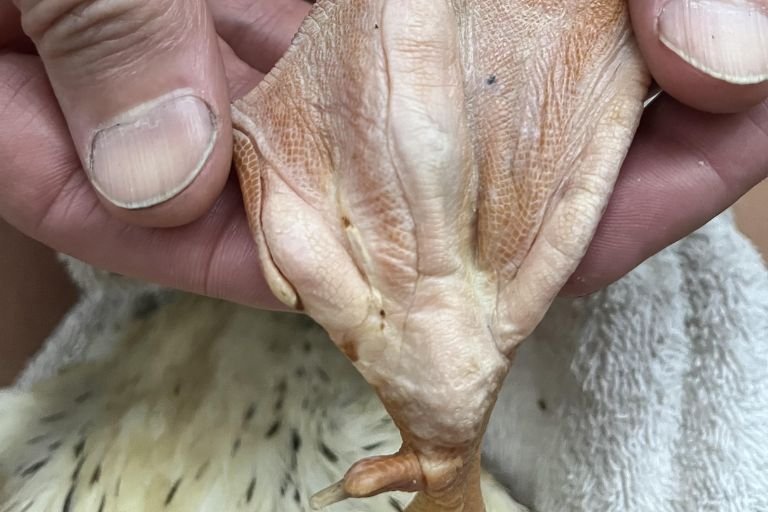
Conclusion
The Muscovy duck is a unique and versatile breed known for its quiet demeanour, hardiness, and excellent meat quality. Its distinctive appearance and low maintenance requirements make it popular for backyard enthusiasts and commercial farmers.
Whether you want to raise ducks for eggs or meat, the Muscovy duck offers a viable option with many benefits. Consider adding this fascinating breed to your flock and experience the joy of raising these remarkable birds. Embrace the charm and utility of Muscovy ducks in your poultry endeavors today!
Frequently Asked Question
What Do Muscovy Duck Eggs Look Like
Muscovy duck eggs are more significant than chicken eggs and have a creamy white or off-white color.
How To Cook Muscovy Duck
Season the Muscovy duck with a combination of salt, pepper, and your favorite herbs and spices for maximum flavor.

